An infamous heist revisited: A crucial clue left behind
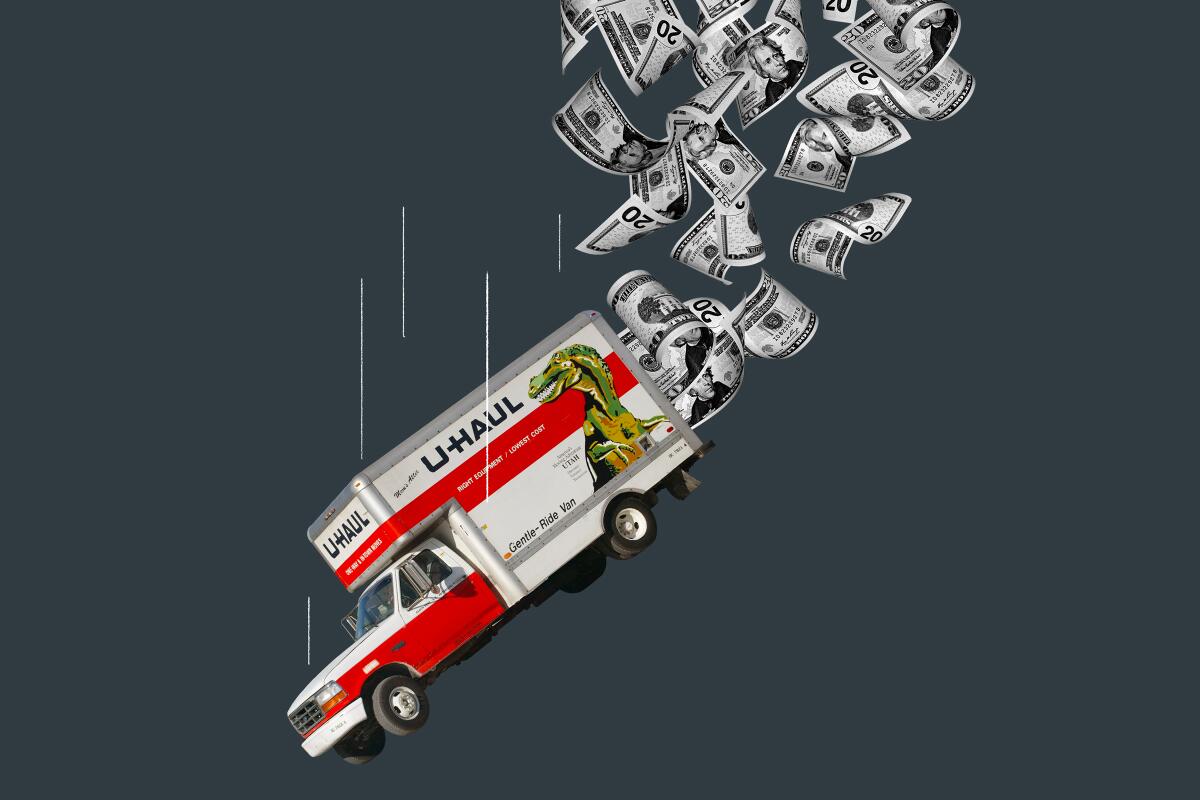
- Share via
Good morning, and welcome to the Essential California newsletter. It’s Tuesday, Jan. 4. I’m Justin Ray.
This is the second story in a series about the Dunbar Armored robbery 25 years ago. Here are the first and third and fourth installments.
After tying up more employees, the robbers used bolt cutters to break the padlocks on metal cages containing the depot’s cash. They stole mostly $20 bills that were meant for drop-offs at automated teller machines throughout the Los Angeles area.
How did the robbers haul away the money? They used a vehicle that wasn’t very discreet; the robbers placed the cash into metal carts, which were themselves wheeled to the loading dock and put into, of all things, a U-Haul truck. The cash created a carpet of money that went all the way up to their thighs, an investigator said.
For good measure, they smashed all of the security video cameras inside the depot and seized the videotapes. Because Pace understood the camera system, he was able to destroy key evidence.
You might be wondering, wouldn’t any of the employees who were tied up recognize Pace’s voice? Well, one apparently did. But there were also signs of forced entry, which Pace’s accomplices later said they had been told to do to throw off the investigators.
After the heist, the men went to one of the men’s apartments, changed into dress clothes and returned to the party. By this point, people would have been properly drunk, so guests may not have noticed the disappearance during the bash.
In 2001, The Times talked to FBI Special Agent John McEachern III and Los Angeles police Det. John Licata, who were at the center of the investigation into the crime. “Both of us, at the crime scene that very first day, we knew we were going to clear this,” says McEachern. “Neither of us said it. It was just sort of a vibe.”
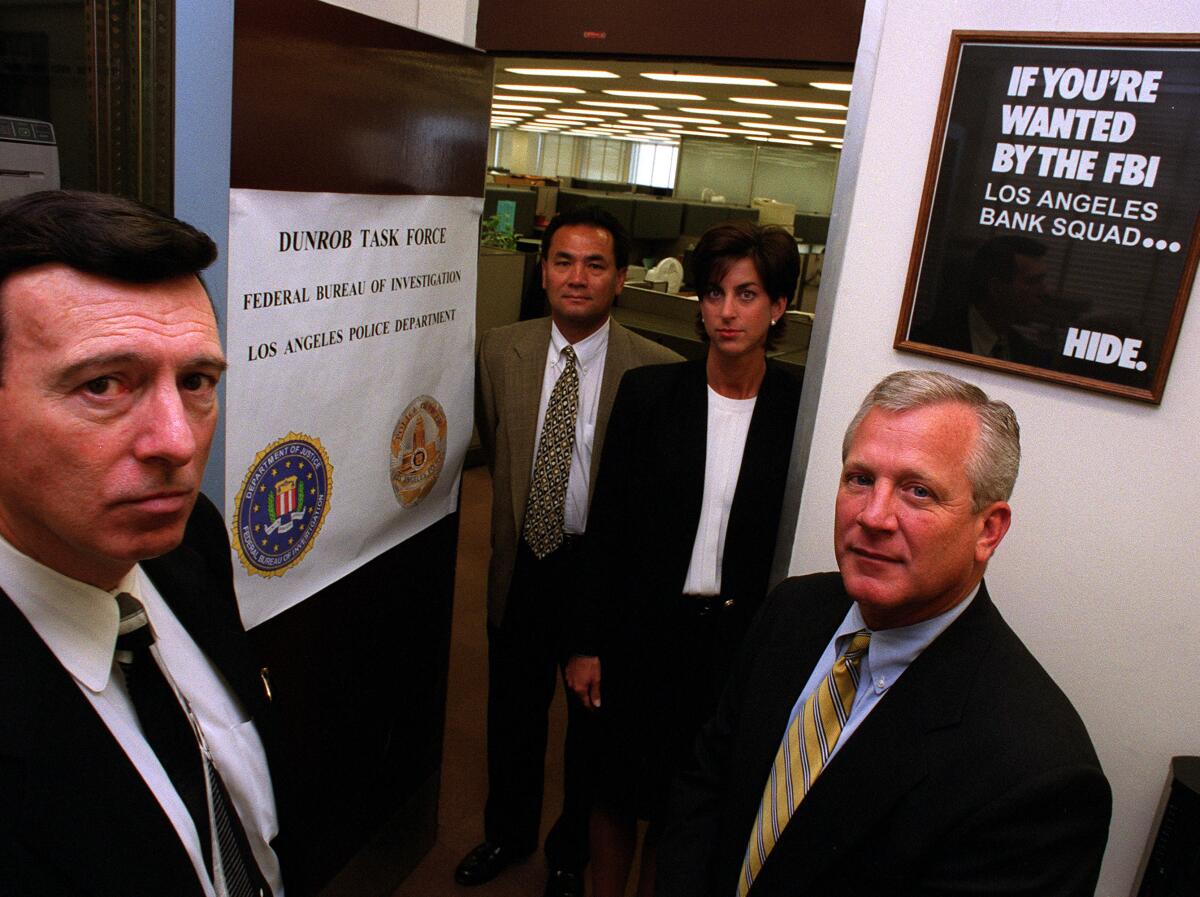
One reason why the heist is not well known may be because investigators downplayed the haul. They feared that if the true size of the haul became public, it would become national news and the robbers would go further underground. For that reason, they say, they described the haul as “more than a million dollars” and nothing more.
They also kept a close eye on Pace and potential suspects to see if they would change their lifestyles in any way, from home purchases to spending sprees.
Due to the precautions the robbers took, there weren’t many clues. Dunbar and Lloyd’s of London (its insurer) posted a $125,000 reward for information leading to the arrest and conviction of the people behind the crime. But as Licata walked alone among a crowd of authorities in the dimly lighted Dunbar garage, he noticed a tiny rectangle of amber-colored plastic that looked as if it had come from a vehicle tail light. It was notable because it didn’t match any of those on company vehicles.
“He’s very thorough,” McEachern said of Licata.
“I just saw it lying there,” Licata told The Times.
An FBI forensics lab in Washington was eventually able to match the taillight to those attached to 14-foot-long U-Haul trucks. But this clue alone wouldn’t be the spark needed to solve the crime. Pace was a suspect from the outset, but authorities didn’t have firm evidence he committed the crime. He and the rest of the crew then kept a low profile, The Times reported.
However, we do know how the men spent much of the money obtained in the heist. Tomorrow, I’ll reveal that, and what ended up getting the crew caught.
And now, here’s what’s happening across California:
Note: Some of the sites we link to may limit the number of stories you can access without subscribing.
How safe are indoor gyms during the Omicron surge? What experts say. The rising risk of COVID-19 infection is causing public health officials and experts to advise more caution in indoor gyms, saying it is critical to mask up inside. Los Angeles Times
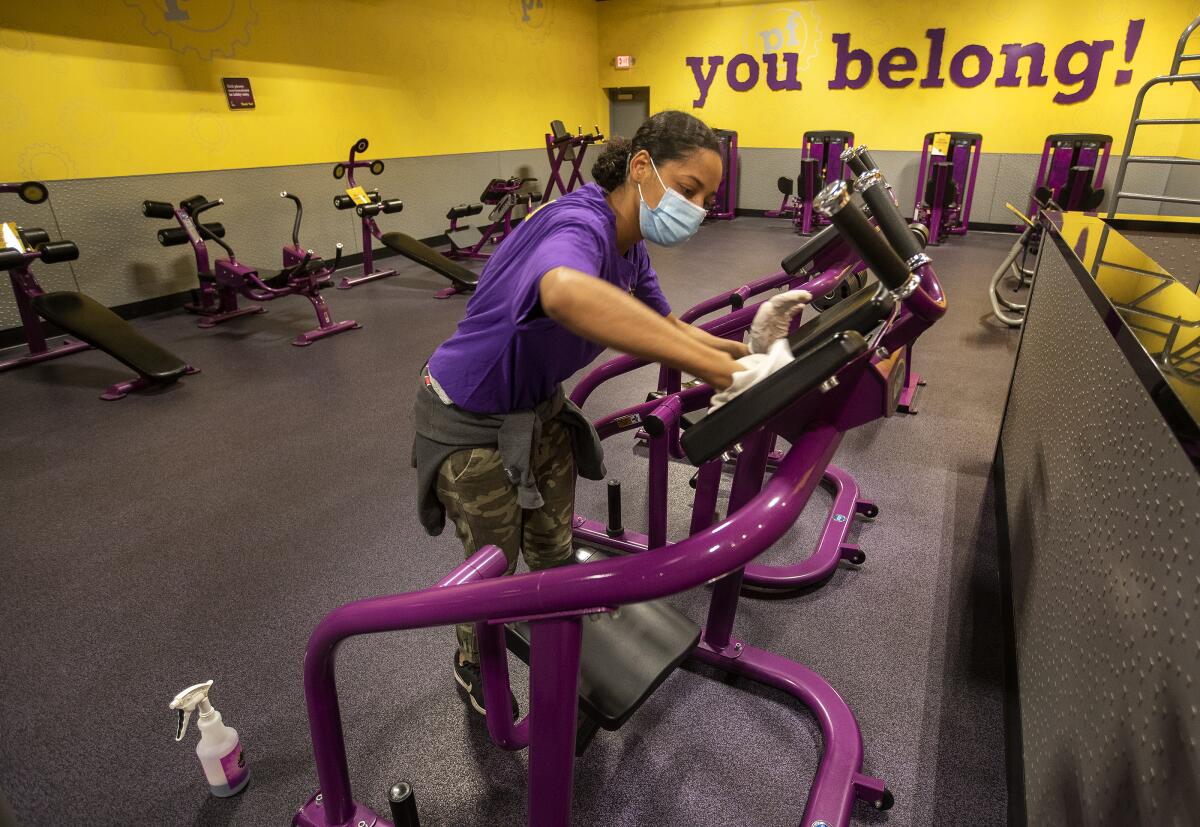
Our daily news podcast
If you’re a fan of this newsletter, you’ll love our daily podcast “The Times,” hosted every weekday by columnist Gustavo Arellano, along with reporters from across our newsroom. Go beyond the headlines. Download and listen on our App, subscribe on Apple Podcasts and follow on Spotify.
POLITICS AND GOVERNMENT
Rep. Devin Nunes’ departure may mean a $1.3-million election tab. Nunes, a controversial San Joaquin Valley Republican and ardent supporter of Donald Trump, has left Congress to head a social media company created by the former president. Now that the resignation is official, Gov. Gavin Newsom has up to 14 days to call for a special election under the “old” 22nd Congressional District electoral lines. The winner of the special election would remain in office until the end of the term on Jan. 3, 2023. Fresno County Clerk James Kus estimates that holding a special general and primary election would cost $1.1 million to $1.3 million. The costs would be borne by county taxpayers. GV Wire
CRIME, COURTS AND POLICING
Former Theranos Chief Executive Elizabeth Holmes was convicted on four counts of fraud and conspiracy Monday. She was found not guilty of four other felony charges and for a remaining three, the jury was deadlocked. Holmes is accused of duping investors and patients about a blood-testing technology that she hailed as a medical breakthrough. Los Angeles Times
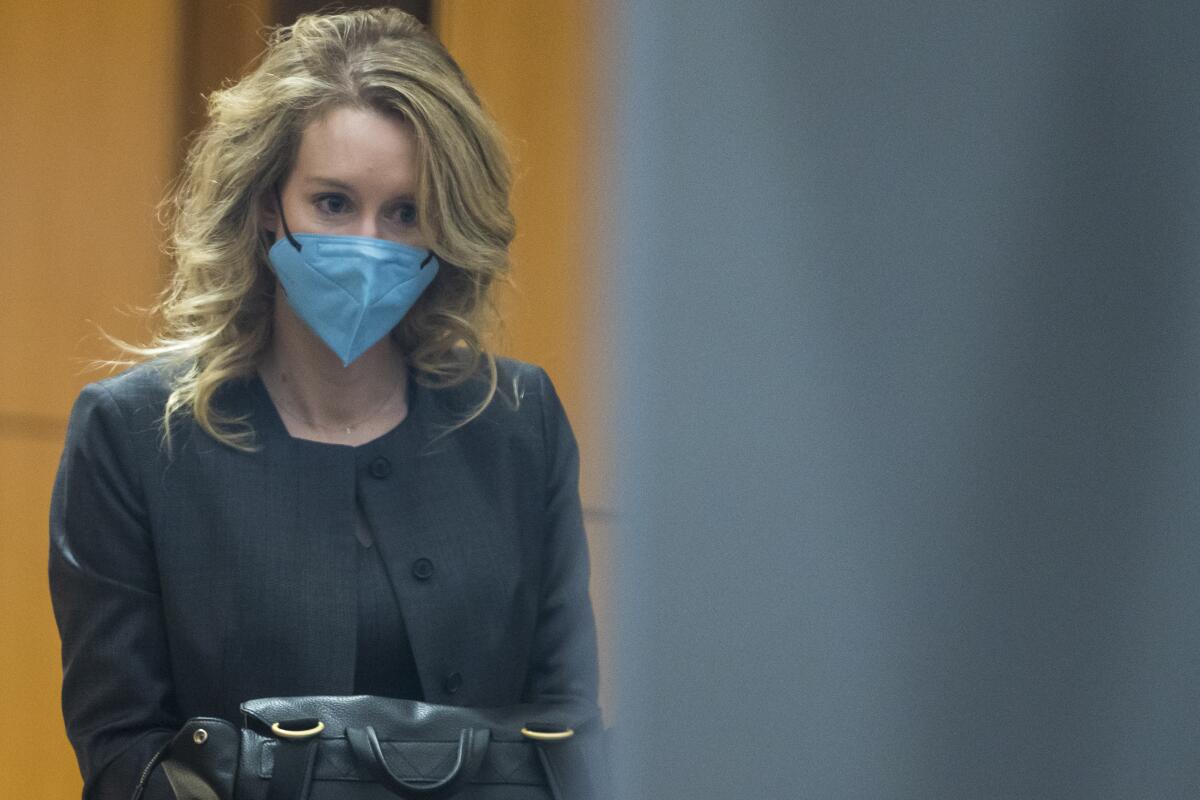
A Sacramento-area man is behind bars after allegedly telling U.S. Secret Service officers about a plot to kill President Biden and other public figures. Kuachua Brillion Xiong, 25, was found by a sheriff sergeant in Iowa’s rural Cass County. During a traffic stop, the sergeant determined that Xiong was traveling to Washington, D.C. He allegedly began talking about his “disapproval for the government due to the sex abuse of children, some of which that has occurred by president Biden.” The suspect created “a list of evil individuals he intended to kill, which included but is not limited to the following politicians and public figures: Bill Clinton, Barack Obama, Dr. Anthony Fauci, and Mark Zuckerberg.” ABC 10
Should police arrest sex workers for standing around? Sex workers are at the center of a heated fight in California over people criminalized for standing on street corners, and what some contend are the subjective and discriminatory criteria for loitering with the intent to commit prostitution. Los Angeles Times
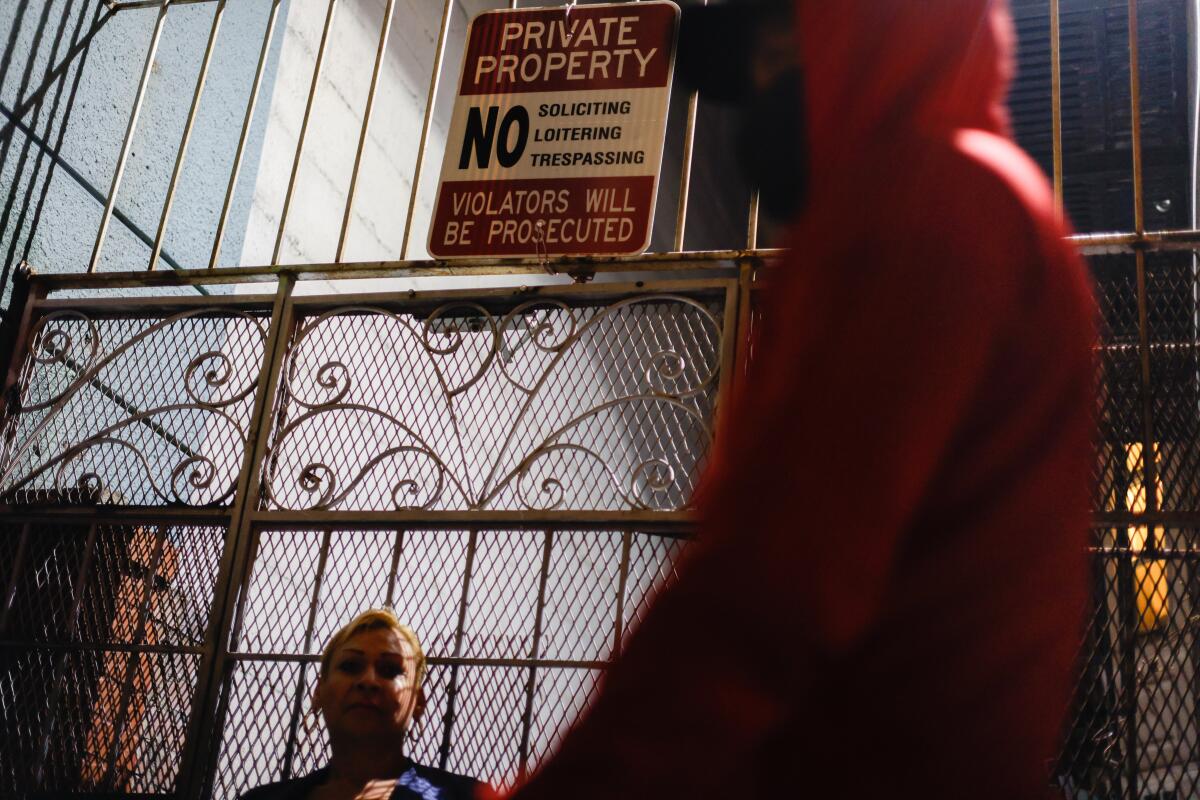
Support our journalism
HEALTH AND THE ENVIRONMENT
In a dramatic sign of Omicron’s relentless spread, the coronavirus transmission rate in Los Angeles County is now estimated to be greater than at any point since the early months of the pandemic, as cases explode across California, data show. Every infected person in L.A. County is on average transmitting the virus to two other people, according to estimates from California’s COVID-19 computer models published Monday morning. By contrast, the effective transmission rate at its worst point in last winter’s surge did not exceed 1.4, estimates from the L.A. County Department of Health Services show. Over the last week, more than 1 in 5 of those tested in L.A. County found they have contracted the coronavirus. Los Angeles Times
With sexually transmitted infections soaring in California, a new law pushes at-home tests. California has become the first state to require health insurance plans to cover at-home tests for sexually transmitted infections such as HIV, chlamydia and syphilis. The rule, part of a broader law addressing the STI epidemic, took effect Jan. 1 for people with state-regulated private insurance plans and will kick in sometime later for the millions of low-income Californians enrolled in the state’s Medicaid program. Los Angeles Times
CALIFORNIA CULTURE
L.A.’s arms race of the affluent. There is only one gun store in Beverly Hills, Los Angeles Magazine reports. Beverly Hills Guns “is a ‘concierge service’ by appointment only, for a largely affluent clientele. And business is booming,” writes Steve Appleford. The rash of highly publicized smash-and-grab robberies has caused the area’s elite to arm themselves — many for the first time. “This morning I sold six shotguns in about an hour to people that say, ‘I want a home defense shotgun,’” says Russell Stuart, who owns the gun store. L.A. Magazine
A Fresno County native is trying to help students in the Central Valley pursue higher education. Michael Piña launched a nonprofit called Central Valley Scholars to give a chance to those who normally may be overlooked for scholarships. “Piña’s efforts are rooted in his upbringing in Kerman, where he lived in a poor immigrant household, sleeping in the living room with his family to escape drive-by shootings,” writes Andrea Briseño. Modesto Bee
Free online games
Get our free daily crossword puzzle, sudoku, word search and arcade games in our new game center at latimes.com/games.
CALIFORNIA ALMANAC
Los Angeles: 61 San Diego: 60 San Francisco: Rainy, 55 San Jose: Overcast, 61 Fresno: Overcast, 57 Sacramento: Cloudy, 56. I need this dog.
AND FINALLY
If you recall, I asked readers for music they listen to when they want some nostalgia in their lives. Here’s a submission by Dani Brusius:
I walk every day, usually twice. My evening stroll was something that I picked up after my husband unexpectedly passed in 2018. It was a way to wind down & hopefully tire me enough to get some sleep. I’m not much of a streamer but instead download music knowing that I’ll like every song that comes up. Aside from his death, 2018 also ushered in ‘Trench’ from 21 Pilots. It was a concept album about death, mental health & suicide. Not a real pick me up but something that gave me a window to grieve. Three years later, I am confined & alone. All of my social activity now gone but I have my walks & a little snippet of socialization with the people who cross my path. So you’d think that songs of death and loneliness would send me into a dark spiral. Instead, when songs from this album come up on rotation they give me a sense of calm & feeling that I can survive this. Crazy huh? Who knew that nostalgia doesn’t have to be the good ol’ times or even something from long ago. It’s something that sets a feeling in your brain & even tho it is from a tragic time in my life it has helped to get me thru the unimaginable that we call pandemic.
One last thing: I wanna say congrats to my friends Cathy and Nelson on their engagement!
If you have a memory or story about the Golden State, share it with us. (Please keep your story to 100 words.)
Please let us know what we can do to make this newsletter more useful to you. Send comments to essentialcalifornia@latimes.com.
Sign up for Essential California
The most important California stories and recommendations in your inbox every morning.
You may occasionally receive promotional content from the Los Angeles Times.




